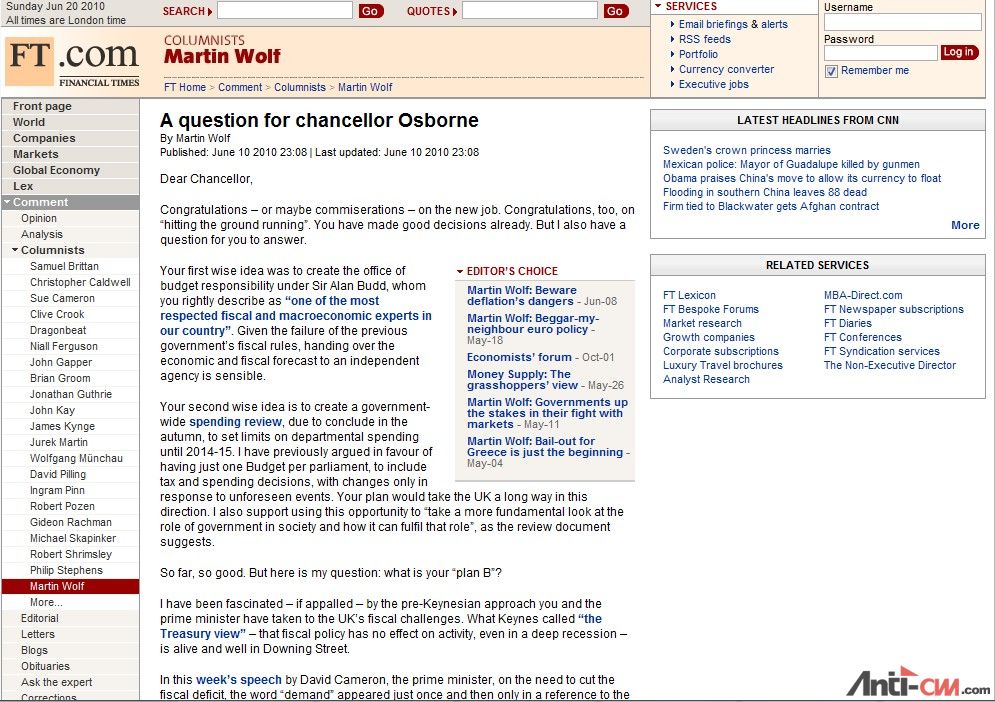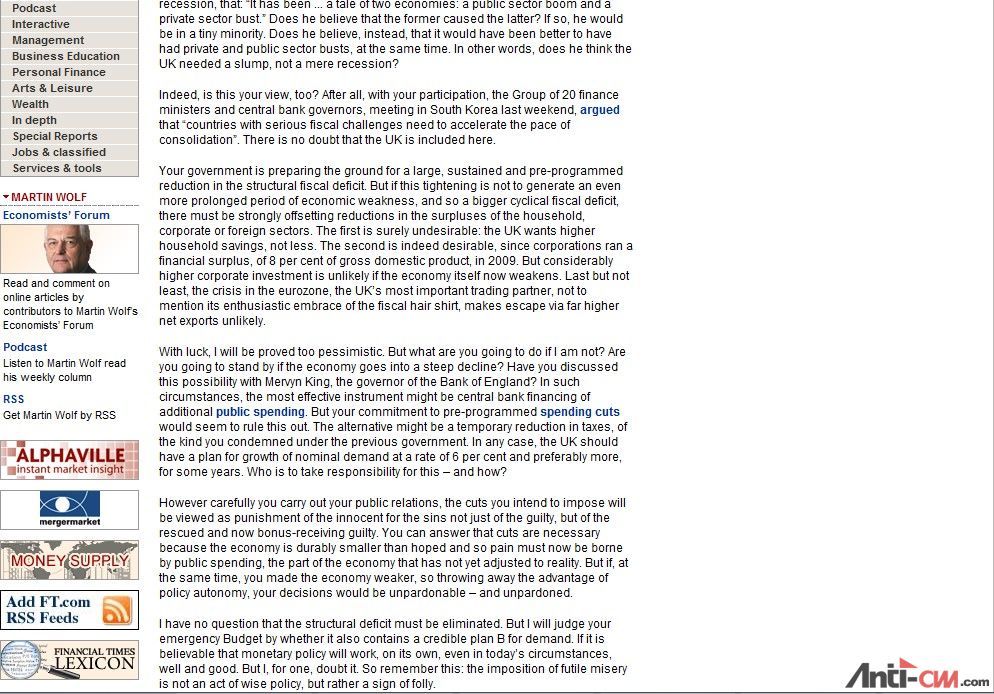|
|
http://www.ft.com/cms/s/0/31d857 ... 7-00144feabdc0.html
A question for chancellor Osborne
By Martin Wolf
Published: June 10 2010 23:08 | Last updated: June 10 2010 23:08
Dear Chancellor,
Congratulations – or maybecommiserations – on the new job. Congratulations, too, on “hitting theground running”. You have made good decisions already. But I also havea question for you to answer.
Your first wise idea was to create the office of budget responsibility under Sir Alan Budd, whom you rightly describe as “one of the most respected fiscal and macroeconomic experts in our country”.Given the failure of the previous government’s fiscal rules, handingover the economic and fiscal forecast to an independent agency issensible.
Your second wise idea is to create a government-wide spending review,due to conclude in the autumn, to set limits on departmental spendinguntil 2014-15. I have previously argued in favour of having just oneBudget per parliament, to include tax and spending decisions, withchanges only in response to unforeseen events. Your plan would take theUK a long way in this direction. I also support using this opportunityto “take a more fundamental look at the role of government in societyand how it can fulfil that role”, as the review document suggests.
So far, so good. But here is my question: what is your “plan B”?
I have been fascinated – if appalled –by the pre-Keynesian approach you and the prime minister have taken tothe UK’s fiscal challenges. What Keynes called “the Treasury view” – that fiscal policy has no effect on activity, even in a deep recession – is alive and well in Downing Street.
In this week’s speechby David Cameron, the prime minister, on the need to cut the fiscaldeficit, the word “demand” appeared just once and then only in areference to the demand by investors for higher interest rates. Theprime minister also noted of the recession, that: “It has been ... atale of two economies: a public sector boom and a private sector bust.”Does he believe that the former caused the latter? If so, he would bein a tiny minority. Does he believe, instead, that it would have beenbetter to have had private and public sector busts, at the same time.In other words, does he think the UK needed a slump, not a mererecession?
Indeed, is this your view, too? Afterall, with your participation, the Group of 20 finance ministers andcentral bank governors, meeting in South Korea last weekend, argued that“countries with serious fiscal challenges need to accelerate the paceof consolidation”. There is no doubt that the UK is included here.
Your government is preparing theground for a large, sustained and pre-programmed reduction in thestructural fiscal deficit. But if this tightening is not to generate aneven more prolonged period of economic weakness, and so a biggercyclical fiscal deficit, there must be strongly offsetting reductionsin the surpluses of the household, corporate or foreign sectors. Thefirst is surely undesirable: the UK wants higher household savings, notless. The second is indeed desirable, since corporations ran afinancial surplus, of 8 per cent of gross domestic product, in 2009.But considerably higher corporate investment is unlikely if the economyitself now weakens. Last but not least, the crisis in the eurozone, theUK’s most important trading partner, not to mention its enthusiasticembrace of the fiscal hair shirt, makes escape via far higher netexports unlikely.
With luck, I will be proved toopessimistic. But what are you going to do if I am not? Are you going tostand by if the economy goes into a steep decline? Have you discussedthis possibility with Mervyn King, the governor of the Bank of England?In such circumstances, the most effective instrument might be centralbank financing of additional public spending. But your commitment to pre-programmed spending cutswould seem to rule this out. The alternative might be a temporaryreduction in taxes, of the kind you condemned under the previousgovernment. In any case, the UK should have a plan for growth ofnominal demand at a rate of 6 per cent and preferably more, for someyears. Who is to take responsibility for this – and how?
However carefully you carry out yourpublic relations, the cuts you intend to impose will be viewed aspunishment of the innocent for the sins not just of the guilty, but ofthe rescued and now bonus-receiving guilty. You can answer that cutsare necessary because the economy is durably smaller than hoped and sopain must now be borne by public spending, the part of the economy thathas not yet adjusted to reality. But if, at the same time, you made theeconomy weaker, so throwing away the advantage of policy autonomy, yourdecisions would be unpardonable – and unpardoned.
I have no question that the structuraldeficit must be eliminated. But I will judge your emergency Budget bywhether it also contains a credible plan B for demand. If it isbelievable that monetary policy will work, on its own, even in today’scircumstances, well and good. But I, for one, doubt it. So rememberthis: the imposition of futile misery is not an act of wise policy, butrather a sign of folly.
Yours,
Martin Wolf



|
|